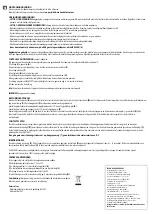
6
$OZD\V SD\ SDUWLFXODU DWWHQWLRQ WR WKH À\LQJ ¿HOG¶V UXOHV
as well as the presence and location
RIVSHFWDWRUVWKHZLQGGLUHFWLRQDQGDQ\REVWDFOHVRQWKH¿HOG%HYHU\FDUHIXOÀ\LQJLQDUHDVQHDU
power lines, tall buildings, or communication facilities as there may be radio interference in their
vicinity.
,I\RXPXVWÀ\DZD\IURPDFOXE¿HOGEHVXUHWKHUHDUHQRRWKHUPRGHOHUVÀ\LQJZLWKLQD
WKUHHWR¿YH
mile range
, or you may lose control of your aircraft or cause someone else to lose control.
$WWKHÀ\LQJ¿HOG
To prevent possible damage to your radio gear, turn the power switches on and off in the proper sequence:
1. Pull throttle stick to idle position, or otherwise disarm your motor/engine.
2. Turn on the transmitter power and allow your transmitter to reach its home screen.
&RQ¿UPWKHSURSHUPRGHOPHPRU\KDVEHHQVHOHFWHG
4. Turn on your receiver power.
7HVWDOOFRQWUROV,IDVHUYRRSHUDWHVDEQRUPDOO\GRQ¶WDWWHPSWWRÀ\XQWLO\RXGHWHUPLQHWKHFDXVHRIWKH
problem.
7HVWWRHQVXUHWKDWWKH)DLOVDIHVHWWLQJVDUHFRUUHFW$IWHUDGMXVWLQJWXUQWKHWUDQVPLWWHURIIDQGFRQ¿UP
the proper surface/throttle movements. Then turn the transmitter back on.
6. Start your engine.
7. Complete a full range check (see p. 22).
$IWHUÀ\LQJEULQJ\RXUWKURWWOHVWLFNWRLGOHSRVLWLRQHQJDJHDQ\NLOOVZLWFKHVRURWKHUZLVHGLVDUP\RXU
motor/engine.
9. Turn off receiver power.
10. Turn off transmitter power.
,I\RXGRQRWWXUQRQ\RXUV\VWHPLQWKLVRUGHU\RXPD\GDPDJH\RXUVHUYRVRUFRQWUROVXUIDFHVÀRRG
your engine, or in the case of electric-powered or gasoline-powered models, the engine may unexpectedly
turn on and cause a severe injury.
:KLOH\RXDUHJHWWLQJUHDG\WRÀ\LI\RXSODFH\RXUWUDQVPLWWHURQWKHJURXQGEHVXUHWKDWWKH
wind won't tip it over. If it is knocked over,
the throttle stick may be accidentally moved, causing
the engine to speed up. Also, damage to your transmitter may occur.
In order to maintain complete control of your aircraft it is important that
it remains visible at all
times
. Flying behind large objects such as buildings, grain bins, etc. is not suggested. Doing so may
result in the reduction of the quality of the radio frequency link to the model.
Do not cover/hold the built-in antenna part of T8J-2.4G transmitter by your hand during
À\LQJ
Do not put any conductive plate/sticker on the antenna part. Otherwise, the operating range
may become shorter.
As with all radio frequency transmissions, the strongest area of signal transmission is from the sides
of the transmitter's antenna. As such, the antenna should not be pointed directly at the model. If your
À\LQJVW\OHFUHDWHVWKLVVLWXDWLRQHDVLO\PRYHWKHDQWHQQDWRFRUUHFWWKLVVLWXDWLRQ
Don’t fly in the rain!
Water or moisture may enter the transmitter through the antenna or stick
openings and cause erratic operation or loss of control. If you must fly in wet weather during a
contest, be sure to cover your transmitter with a plastic bag or waterproof barrier. Never fly if
lightning is expected.
Summary of Contents for T8J-2.4G
Page 93: ...93...







































